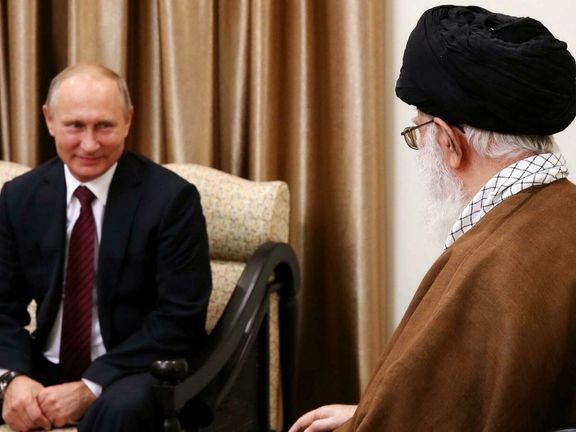Iran Factions Dispute Russia’s Role In Vienna Nuclear Talks

Kayhan newspaper Monday attacked reformists for doubting Russia and China's role as Iran works with world powers in Vienna to revive the 2015 nuclear deal.

Kayhan newspaper Monday attacked reformists for doubting Russia and China's role as Iran works with world powers in Vienna to revive the 2015 nuclear deal.
In a note published Monday, the flagship hardliner newspaper said reformists had long been “whitewashing” the 2015 agreement – the JCPOA (Joint Comprehensive Plan of Action) – while imputing dubious motives to both Moscow and Beijing.
Kayhan has close links with Supreme Leader Ali Khamenei’s office and its editor is appointed by Khamenei.
Kayhan, whose editor Hossein Shariatmadari opposed the JCPOA, signed by the reformist-backed government of President Hassan Rouhani, said reformists were alarmed that the agreement would be revived with better terms under President Ebrahim Raisi (Raeesi), who took office in August.
Among reformists expressing concern over Russia, Fayyaz Zahed, senior member of Etemad Melli Party, wrote Saturday in the party's Etemad newspaper that “a nuclear Iran” would be “a threat to Russia, more than it is to Europe and America.”
Zahed highlighted Moscow’s security relationship with Israel – presumably over Syria, where the two sides have coordinated their air presence, even though Moscow, like Tehran, backs President Bashar al-Assad.
Zejad also called for direct talks with the United States. While Iran has ruled out face-to-face discussions with the US since Washington left the JCPOA in 2018 and worked to keep the negotiations locked to JCPOA structures, extensive bilateral meetings preceded the deal being agreed in 2015.
"Meet and speak with Americans yourselves,” Zahed counseled. “The Leader has previously authorized that. Why should the most important decisions and negotiations of the country in decades be entrusted to precarious and unreliable middlemen?"
The author clearly referred to Russian and Chinese diplomats rather than those of France, Germany and the United Kingdom, the other JCPOA signatories in Vienna. Zahed suggested that Iran might somehow “become the price paid by Russia and China for resolving tensions” with the US over Ukraine and Taiwan.
Iran as kingmaker
A great sense of Iran not flexing its muscles was conveyed in a commentary in the reformist Shargh daily, where economist Gholamreza Nazarboland last Tuesday called Iran a "kingmaker" and "balancer" in the Middle East that could tip the scales of world power simply by who it chose to align with.
"It is probably for this reason that Russia has used the opportunity to place itself in the current talks in Vienna in the role of a connecting link in the absence of the US which is not directly present," Zahed wrote.
Alleging that Russian envoy and avid tweeter, Mikhail Ulyanov "shrewdly" pushed Russian policy, deciding “which facts to report and which to hide,” Zahed suggested Moscow sought to make Iran dependent on Russia, and to control its relations with the “western world,” particularly the US.
Some conservatives are also wary of Russia and China influencing negotiations. The conservative Jomhouri Eslami has repeatedly accusedUlyanov of "meddling." In an editorial Tuesday headlined "Ulyanov Is Not Iran's Envoy", it criticized Iran’s foreign ministry for not taking action.
Jomhouri Eslami was outraged that in many meetings with delegations from Saudi Arabia, the US, and European countries, Ulyanov had "engineered" the outcome of the Vienna talks to suit his own government's interests.
"Protesting to Ulyanov's behavior is a patriotic act, demand for independence, and aimed at preventing foreign interference,” the editorial declared.